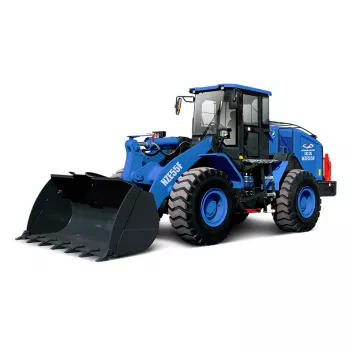How to Maintain Electric wheel loader?
Investing in an electric wheel loader is not just a commitment to sustainability but also a wise decision for long-term efficiency and cost savings. To ensure that your electric wheel loader continues to perform at its best and lasts for years to come, proper maintenance is essential. In this comprehensive guide, we'll walk you through essential tips on how to maintain your electric wheel loader effectively.
1. Regular Inspection Routine
Establishing a regular inspection routine is the foundation of maintaining your electric wheel loader. Conduct daily pre-operational checks to identify any visible signs of wear, loose bolts, or potential issues. Pay close attention to tires, hydraulic systems, electrical components, and the battery. Early detection of problems can prevent costly breakdowns and downtime.
2. Keep the Machine Clean
A clean machine is a happy machine! Regularly clean the exterior of your electric wheel loader to prevent the buildup of dirt, debris, and corrosive materials. Use mild detergents and water to avoid damaging sensitive components. Clean the radiator and cooling system to maintain optimal operating temperatures, especially in dusty environments.

3. Battery Care
The heart of an electric wheel loader lies in its battery. Proper battery care is crucial to ensure peak performance and longevity. Follow the manufacturer's guidelines for charging and discharging the battery. Keep the battery and its terminals clean and free from corrosion. Inspect the battery regularly for any signs of damage or leaks and replace it if necessary.
4. Lubrication Maintenance
Appropriate lubrication is essential for the smooth functioning of your electric wheel loader. Regularly check and lubricate all moving parts, including joints, hinges, and pivot points. Use the recommended lubricants specified by the manufacturer to prevent component wear and reduce friction.
5. Tire Inspection and Maintenance
Tires play a vital role in the performance and stability of the wheel loader. Check tire pressure regularly to ensure it meets the recommended levels. Inspect tires for signs of wear, cuts, or punctures. Rotate the tires periodically to promote even wear and extend their lifespan.
6. Hydraulic System Checks
The hydraulic system is a critical component of the electric wheel loader. Regularly inspect hydraulic hoses and connections for leaks or damage. Check hydraulic fluid levels and top up when necessary using the recommended hydraulic fluid specified in the machine's manual.
7. Electrical Component Maintenance
Electric wheel loaders rely on sophisticated electrical systems. Keep all electrical connections secure and inspect them regularly for any signs of wear or corrosion. If you notice any electrical issues or malfunctions, address them promptly to avoid potential safety hazards.
8. Operator Training and Safety
Proper operator training is vital to ensuring the longevity of your electric wheel loader. Educate operators on the correct operation and handling of the machine. Emphasize safety protocols and procedures to prevent accidents and minimize wear and tear caused by operator errors.
9. Scheduled Maintenance and Servicing
Follow the manufacturer's recommended maintenance schedule for your electric wheel loader. Scheduled servicing by qualified technicians ensures that your machine receives professional care and attention. Regular maintenance helps identify and address potential issues before they escalate into costly problems.
Conclusion
Maintaining your electric wheel loader is essential for maximizing its efficiency, longevity, and performance. By following these maintenance tips, you can keep your electric wheel loader operating smoothly, minimize downtime, and get the most out of your investment. Regular inspections, proper cleaning, battery care, and adherence to the manufacturer's guidelines are all key factors that will contribute to a reliable and sustainable electric wheel loader.
评论
发表评论